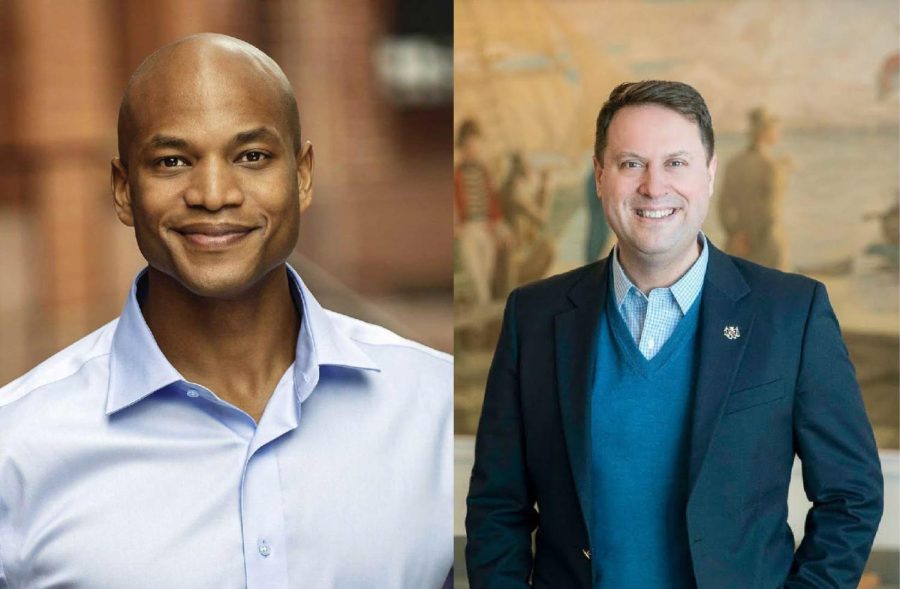Cox vs. Moore: the race for Maryland’s governorship
As November 8th approaches, Maryland will soon decide who will be its next governor, a decision that will influence every facet of the state. Right now, as high schoolers, most of us are below the voting age. However, whether or not we can vote, we can become informed about not only what’s happening around us, but also how our values reflect on the political process. After all, the practice of politics is just determining what values we as a society hold as the most important—whether that be freedom of choice in the form of abortion, or equality in the form of everyone receiving a quality education—and enshrining those values in law and policy. So, even though as high schoolers we can’t view this upcoming gubernatorial election from the perspective of voters, we can view it from the lens of future voters and of citizens who will be impacted by the decisions of the governor chosen in this election. Doing so begins with learning about the two candidates for the governorship: Dan Cox and Wes Moore.
By defeating Kelly Schulz in the primary elections in July, 48-year-old Daniel L. Cox became the Republican candidate for the governorship of Maryland. In 2018, Cox was elected to the Maryland House of Delegates, as the representative for parts of Frederick and Carroll Counties. He graduated from the University of Maryland University College (now called University of Maryland Global College) with a BA in Government and Politics. He also received a JD from Regent University in Virginia. He is married with ten kids. Prior to running for governor, Cox was an attorney — eventually creating his own law firm, — a high school teacher, a real estate agent, and the president of a town commission in the Eastern Shore.
During his political career, Cox has championed conservative positions. In February of 2022, he attempted to impeach Governor Hogan for his coronavirus policies, which Cox asserted obstructed the freedoms and liberties of Maryland residents. He has advocated for restrictions on abortion, repealing gun-control legislation, prohibiting mask and vaccine mandates, and limiting the emergency powers of the governor. He has also denied the results of the 2020 presidential election. Unsurprisingly, he has been heartily endorsed by former-President Trump. On the other hand, current Governor Hogan, a moderate Republican, described Cox as a “QAnon whack job.” Indeed, Cox did attend a meeting this past spring that advocated QAnon conspiracy theories about 9/11.
On the other end of the political spectrum lies Wes Moore. Unlike Dan Cox, Wes Moore’s bid for Maryland’s governorship serves as his entry into politics. From being a paratrooper in Afghanistan, Rhodes scholar, White House Fellow, best-selling author, investment banker, and the CEO of a New York City’s largest poverty-focused nonprofit, Moore has an impressively varied resume. This lack of political experience has not seemed to turn off voters, as October polling suggests that he is beating opponent Dan Cox by a 2-to-1 margin.
His campaign focuses on the theme of equality. Within his central issue of striving toward equal economic opportunity, Moore has said that one of his priorities would be “Trauma informed care.” This policy would focus on healing communities by recognizing and addressing past trauma. For example, Moore has stated that he would view issues such as education, public safety, and city planning from this trauma-informed perspective. He also has advocated for protecting reproductive rights, aiding the underprivileged, and attempting to repair the political divide.
Upon the overruling of Roe v. Wade in Dobbs v. Jackson Women’s Health Organization, access to abortion has become even more of a focal point in American politics. Consequently, it is important to see in more detail each candidate’s approach to abortion, which has been protected in Maryland state law since 1991, with two restrictions. First, a minor’s guardian must be notified before the minor can receive the procedure. Second, an abortion can occur after the fetus becomes viable only if the patient’s health is endangered or there is an abnormality with the fetus. Further efforts to add abortion to the state constitution have failed, such as when this past spring the Maryland Senate decided to focus on legislation expanding abortion access rather than a constitutional amendment. Consequently, while abortion is protected in Maryland, the future governor will certainly be able to influence access throughout the state, either by preventing funding for expanded access to abortion from being distributed or by effectively lobbying for a constitutional amendment protecting abortion.
Dan Cox has said that his policy agenda will focus on “children, careers and community.” Indeed, he has stated that he is not going to focus on abortion, instead directing his attention to quality of life issues, such as crime, education, and the economy. Nonetheless, Cox opposes abortion. In response to the many out-of-state residents who travel to Maryland for abortion access, Cox stated that he intends “to stop the flood of our taxpayer funds, of millions and millions of dollars, into other people’s choices from out of state.” Moreover, his campaign website states that he “defends the unborn and promises to protect all life from conception until natural death.” In regard to contraception, Cox has stated that it is a decision between a patient and their doctor, but that he would not support taxpayer funding used to provide contraception.
Wes Moore, on the other hand, supports abortion and has stated that he will try to further protect and increase access to it. Most notably, he has said that he would support a constitutional amendment to protect abortion.
Beyond their positions, it’s important to recognize the feasibility of either candidate being able to pass their policies. Democrats currently hold a veto-proof supermajority in the Maryland General Assembly. It is unlikely that they will lose their hold to Republicans come midterms. Consequently, if Cox were to be elected, he would have a tough battle both securing his own legislation and preventing the Democrats in the legislature from passing their policy agenda. He would, however, be able to limit the resources that are allocated to abortion and contraception. For example, Hogan, through his executive powers, has already held back funding meant to train reproductive health care providers — a policy Cox could continue but Moore has promised to rescind. On the other hand, Moore would have no trouble introducing and passing legislation. Moore may even be able to pass a constitutional amendment to protect abortion in the Maryland constitution. In response to the political challenges he faces, Cox has said that he will work across party lines and utilize his bully pulpit as governor to further his policies.
As part of a high school, we should also take special note of the candidate’s positions on education. Both Cox and Moore have placed education as an important issue of their platforms. Cox’s approach is on “ending the crisis in our education system by including parents and empowering parents to have their voices heard.” Specifically, he has opposed a bill that would enable 12-16-year-olds to receive mental health care, including diagnosis, without their parent’s permission. Cox has vowed to end what he called the “indoctrination” of students, including kindergarteners. This ‘indoctrination’ is in reference to discussions about gender identity from kindergarten through third grade in some classrooms. He also opposes transgender athletes in schools, saying “I want to make sure that we don’t force those born as male to compete with young ladies in sports.” In general, Cox hopes to turn away from LGBTQ topics in schools, and return to “making sure that our kids know how to read and write.”
Moore’s position on education follows a standard progressive platform. He supports increased funding to schools, raising teachers’ wages, making childcare more affordable, and combating the “school-to-prison pipeline.” A feature of his platform that stands out, however, is that he has supported a year of public service for Maryland high school graduates. The plan, similar to previous Democratic presidential candidate Pete Buttigieg’s suggestion of mandatory national public service, would provide graduates with opportunities to take part in national service programs, such as the Peace Corps or Americorps.
Now that you know a little bit about the two candidates, reflect again on which candidate overall reflects your values and vision for an improved Maryland. Whether Maryland chooses Cox or Moore as its governor will affect education, drug use, crime, abortion, the economy—indeed every aspect of this state. Consequently, it is vital that whether or not we can vote in the election, we are educated about the policies of those who are running so that when we do vote, whether in this election or in the future, we can make informed decisions and beneficial decisions.
Hi! My name is Alexios Eleftheriou and I am a sophomore at Sandy Spring Friends School. This is my first year at the Wildezine. I enjoy writing about politics...







Zoe • Nov 5, 2022 at 9:21 pm
Thank you for sharing this valuable information on the candidates for governorship. I like that the information about each candidate is provided from an unbiased lens. I hope students share this with their parents!